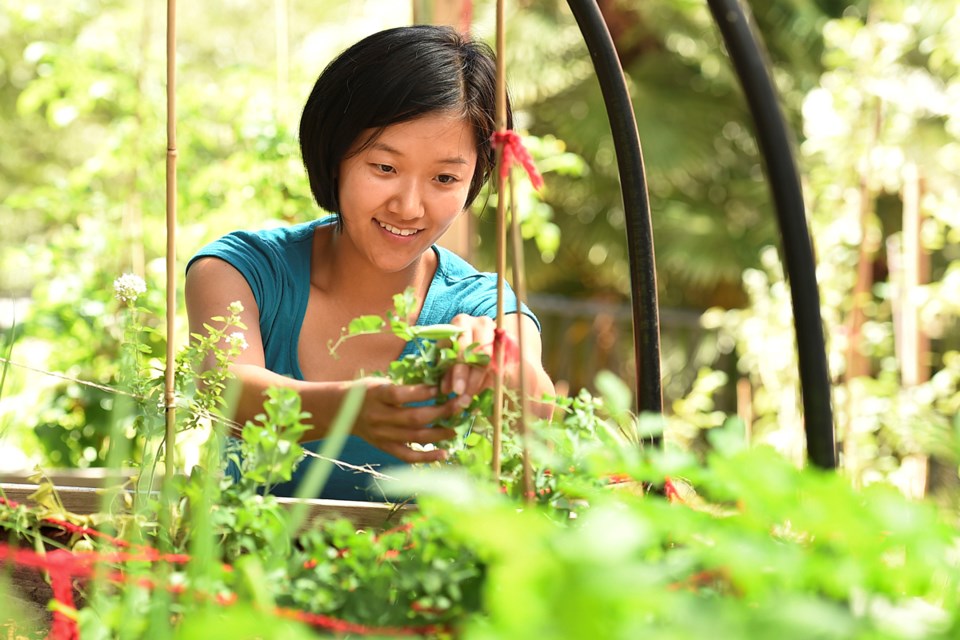When Queenie Hewitt toils in her local community garden, it is more than just a hobby. It is a manifestation of her Christianity.
Hewitt, and a fast-growing number of other Christians, are finding connection to God in the soil of the earth.
“For us, it’s about connecting with God the creator,” says Hewitt, whose community garden is tended by members of the Tenth Avenue Alliance Church in Mount Pleasant. “Through gardening, we get a sense of His character and we put our trust in Him,” she says. “We have that act of faith and see Him provide.”
The food the garden produces helps feed locals at public community meals every Monday and Tuesday.
In addition to her volunteer gardening, Hewitt works part time for A Rocha, a Christian organization dedicated to environmental education and sustainable agriculture.
Markku Kostamo is president of A Rocha, which is headquartered on a magnificent 18-acre heritage farm in south Surrey, called Brooksdale, and which has other centres in Manitoba and Ontario. The organization spread from Portugal 30 years ago (A Rocha simply means “the rock” in Portuguese) to 24 countries and has been in Canada for 15 years. The name comes from the Church of the Rock, where the movement began, but has multiple meanings including the geological and theological.
“As a faith-based Christian organization, the bedrock of our faith is Jesus Christ, the rock,” says Kostamo, a trained ecologist who was working in the forest industry in Tofino when he had an epiphany of sorts.
“I’m not against forestry,” he says, “but we shouldn’t be harvesting these uniquely ecological places that you need helicopters to get to and the trees are 900 years old.”
He had a “conversion moment” and wondered what would happen if all two billion Christians had a similar one. What would the planet look like, he asks, if all Christians worldwide aligned with the environmental movement because of their faith?
“That’s kind of what has driven us,” he says. A Rocha’s work in B.C. is focused on restoring salmon streams, working with species at risk and doing environmental education with school groups, churches and conservation organizations.
Also central to their work is sustainable agriculture, in which about 400 individuals or groups buy shares in the year’s crops — it’s called “community supported agriculture” — and they share the risks and bounty of farming. If a hailstorm hits, shareholders suffer. Bumper crops are more common, though — many recipients tell Kostamo’s group their vegetable and fruit deliveries are overly generous. Some churches buy shares for food banks.
A nondenominational Christian organization, A Rocha members view environmental stewardship as core to their religious convictions.
“It’s not an afterthought,” Kostamo says. “We’re all in this. There’s nobody who’s excluded. If we breathe and eat, we are all environmentalists, or at least we should be. We see this theme of creation right through the biblical narratives and we see this as core to our faith. Part of our stewardship and part of our mandate and part of our role as people actually is to steward this planet, to steward this creation. That’s our primary calling.”
Kostamo describes Brooksdale, which is open to the public, as a mashup between a conservation organization, an organic farm and a youth hostel. In the summer especially, the place is humming with interns and volunteers. Church groups and schools come for volunteer days. A small staff keep the farm running year-round and offer programs, including a “spirituality of gardening” seminar Sept. 19.
Matt Humphrey, Brooksdale’s assistant director, is helping organize the seminar. He sees a huge growth in interest among religious people to get back to the land, to get their hands dirty and connect with the natural world. Maybe there is a correlation between the decline in religious observance and the succession of generations that have moved from farm to city in the past century, I suggest and Humphrey agrees.
“We recognize that there is a kind of deep connection with our human life to the life of creation, of the natural world,” Humphrey says. “Food and gardening are one of the more immediate ways that we connect into that. How is it that putting our hands in the soil and growing things connects us to something deep about what it means to be human and about being part of the created world?”
Humphrey has a pretty sweet deal living a farm life in the Lower Mainland, but he says city folk are also digging their gardens.
“I sense that even in urban settings, there is a desire to get back in touch with that,” he says. “Much of the interest I think in community gardening and rooftop gardening, all of that, is just a desire to be back in touch with that part of ourselves that we’ve become detached from.”
There seems to be a definite shift toward Christian ecology, not only in the burgeoning of groups like A Rocha, but of course in the landmark encyclical on caring for the earth issued by Pope Francis recently. (Next week, I’ll introduce you to a group of young activists of all faiths who are throwing themselves into the environmental cause.)
For Kostamo, caring for the environment is a new cause for evangelism.
“We see that as core to our faith,” he says. “And not all Christians do. If all Christians saw the world this way and saw that their faith this way, it’d be a good place. We wouldn’t need to exist.”
PacificSpiritPJ@gmail.com
@Pat604Johnson



